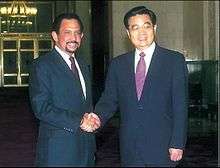Brunei–China relations
 | |
Brunei |
China |
|---|---|
Brunei–China relations refers to bilateral foreign relations between Brunei and China. Brunei has an embassy in Beijing, and China has an embassy in Bandar Seri Begawan.[1]
History
Relations between the two nations can be traced back to over 2,000 years ago when both started to trade with each other, as early as the Western Han periods.[2] Some historians also suggest Chinese settlers from Fujian Province arrived in Borneo and settled in the area which is now called "Brunei" in the 13th and 14th centuries.[2] While in the 15th century, the Sultan of Brunei at the time, Abdul Majid Hassan died during his travels to China, despite the Chinese emperor's best efforts to help treat the Sultan's illness.[2] The Sultan was later buried with a royal tribute in Nanjing and continues to serve as a symbol of the relationship between the countries even today.[2]
In modern times relations are not close since Brunei was a British protectorate, beginning in the 19th century until it gained official independence on 1 January 1984.[2] During this time, there were also various concerns in Brunei particularly toward communism and its sensitivities to the ethnic Chinese population.[2] By 30 September 1991, Brunei had become the last member of ASEAN to establish official diplomatic relations with China.[1]
Economic relations

In 2011, trade between the two countries has increased to U$1.3 billion.[2] The two countries promote practical co-operation in some areas such as infrastructure construction, agriculture and fishery.[3] Some Chinese companies also have agreed to finance two projects in aquaculture and paddy production in Brunei which worth about U$10 million.[4]
The Brunei-Guangxi Economic Corridor was establishd in 2014, into which approximately USD$500 million has been promised.[5] China is the largest foreign investor in Brunei, with investments estimated at USD$4.1 billion.[5]
The Chinese Ambassador to Brunei, Yang Hian, described Brunei as an important part of the Belt and Road Initiative.[5] China and Brunei operate Brunei's largest port, Muara Container Terminal, as a joint venture between China's Guangxi Beibu Gulf Port Group and Darussalam Assets Sdn Bhd.[5]
According to Chatham House fellow Bill Hayton, China is pressuring Brunei to allow it more access to Brunei's exclusive economic zone.[5]
See also
Further reading
References
- 1 2 "Brunei-China Relations". Ministry of Foreign Affairs and Trade (Brunei). Archived from the original on 22 February 2014. Retrieved 17 February 2014.
- 1 2 3 4 5 6 7 Prashanth Parameswaran (9 November 2012). "China, Brunei: ties that bind". Asia Times Online. Retrieved 17 February 2014.
- ↑ Zhu Ningzhu (11 October 2013). "China, Brunei agree to further boost strategic cooperation". Xinhua News Agency. Xinhua.net. Retrieved 17 February 2014.
- ↑ "China Firms in B$10m Brunei Rice-Growing and Aquaculture Projects". The Brunei Times. Embassy of China in Brunei. 12 November 2009. Retrieved 17 February 2014.
- 1 2 3 4 5 Bowie, Nile (March 18, 2018). "China throws sinking Brunei a lifeline". Asia Times Online.

.svg.png)